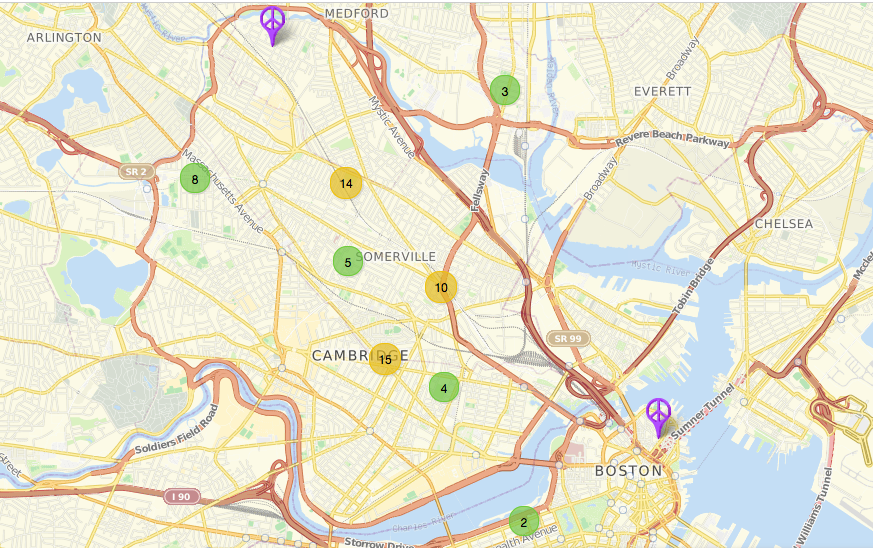
Stop me if you’ve heard one of these before: “[something online/digital] is super-awesome because it’s ‘open’—anyone can participate! Our cool [product/app/service] allows people to [action] all by themselves, without going through [older gatekeeper/channel/service provider]! Our [product/app/service] is totally going to [democratize/revolutionize/‘be a game changer for’] the world of [action]-ing, because now anyone can [action]!” The tl;dr here is that “openness” undermines existing power structures and institutions, and that this opened or leveled playing field allows individuals both to take new autonomous, self-directed actions and to collaborate with each other in new ways.
This isn’t the whole story, however, nor do most “open” initiatives really play out that way. Zeynep Tufekci (@techsoc) does a great job of explaining how “flat” or “horizontal” networks evolve into hierarchical structures “not in spite of, but because of, their initial open nature.” Tufekci makes her argument in the context of examining the “leaderless” revolutions of the Arab Spring; Wessel van Rensburg (@wildebees) draws on Tufekci & others to situate this kind of optimism about “openness” in the broader context of early Silicon Valley and technoutopianism. I’m now going to provide a case study of openness’s utopian promise gone awry with a much more banal example: Craigslist, and four of my own experiences apartment hunting in the Boston area between 1999 and 2013.
The Post-Internet but Pre-Craigslist Era

In December of 1999, I embarked upon my very first apartment search (I wasn’t yet old enough to buy alcohol, but apparently I was old enough to buy a year’s worth of living space in twelve monthly installments). Back then, there were three ways to find an apartment: you could contact a realtor or real estate agent, who would charge a fee (usually to you, but occasionally half to you and half to the landlord) equal to one month’s rent when you signed a lease on a place s/he had shown you; you could respond to classified ads in the newspaper (primarily the Boston Globe), which usually led to realtors, real estate agents, or management companies, but which occasionally led to landlords leasing directly (in which case, the landlord would only charge you to run a credit check, if that); and you could pay a flat fee to access an online database of “no fee” apartments for a limited period of time (if I remember correctly, the website most of my friends and I used charged $50 or $60 for 60 days of access to that site’s listings; there was another website that offered a similarly priced service for finding roommates).
There wasn’t much on the “no fee” apartments site at the time, so I ended up spending three days looking at apartments with an agent before applying for one and then signing a lease. I found the agent by applying to a classified ad for a particular apartment; the agent then asked me questions and had me fill out forms about what I was looking for in a place, then lined up a bunch of showings. At the end of it, I got a three-room “studio” that came to be known as The Back Bay Menagerie, and my agent got a check for an amount equal to my monthly rent.
The Earlier Craigslist Era

In mid-2000, something happened that started to change how people found apartments in the Boston area: Boston became the second Craigslist city (the first had been San Francisco). As you’re probably aware, Craigslist is like an online classified ads service through which people—random people, “anybody”—can post long-form ads for free[i]. In the realm of rental real estate, the arrival of Craigsist meant three things: landlords (or brokers) could post ads for vacant apartments without to go through a print newspaper’s classifieds department; landlords had a new way to find prospective tenants without going through a broker; and tenants could find landlords without going through brokers or paid-access listing services.
By May of 2002, when I was next looking to start a new apartment, Boston Craigslist had taken off. The metro area itself was divided by geography into a few subcategories; the “Apartments for Rent” part of the site had sections for “by broker,” “by owner,” and “no fee,” and there were a lot of apartments in the “by owner” and “no fee” sections. My then-housemate and I found an apartment in the “by owner” section, so all we paid to move into the apartment known as Plaguehaus was first month’s rent, last month’s rent, and security deposit—no broker’s fee or “finder’s fee.”
A little over two years later, when I was next looking to move, Craigslist was the first place I looked. I ended up falling in love with an apartment based on the pictures in a posting; when I went to go see the place, it turned out that—wonder of wonder, miracle of miracles—the pictures were actually representative of the apartment. The place was listed through a broker, so there was a fee, but it was worth it: I lived in that apartment (attikhaus) for four years, and never would have moved if I hadn’t started graduate school 3,000 miles away. If I could have dragged the apartment across the country with me, I’d have done it in a heartbeat.
The Present Day Craigslist Era
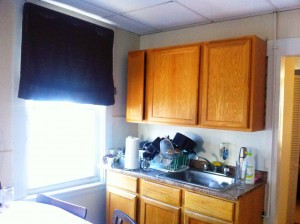
Fast forward to the fall of 2012, which is when I first started watching the Boston-area “Apartments for Rent” section, in advance of my much-anticipated return to the East Coast—and was shocked to find the Craigslist “scene” radically changed since my last Boston-area apartment hunt. Sometime in the intervening eight years, the Boston Craigslist “Apartments” section had become nearly unusable. There were very few apartments listed by owner; many of the “no fee” apartments were actually miscategorized posts for rooms in occupied apartments, posted by people seeking roommates; apartments in places like Waltham, Woburn, and Winchester were posted in the Boston/Cambridge/Brookline subsection (hint: it is not easy to confuse these areas—they are quite different); spammers copied pictures from legitimate listings to offer imaginary apartments for ludicrously sub-market rents.
But what really got me was the behavior of some Boston brokers. Sometimes four or five different people from the same brokerage would post the same apartment, and would each post that apartment in two or three slightly different ads (occasionally changing the rent by $5 or so to make it look like a different place), and would then post each of those slightly different ads several times, and would repeat this process every day until a place finally rented—or, as I discovered once I began looking for a place in late December, sometimes even after a place rented. As one broker explained to me (by way of half-apologizing for the fact that the apartment I’d come to see had rented days previous), “Well you know, the Internet makes it real easy to repost a place, and sometimes not everyone [in the brokerage] knows when something rents.”
It’s not intellectually difficult to see through these tactics, but it does take a lot of work. One company that’s particularly guilty of over-posting usually (but not always) posts reference numbers in their ads; this means that, if you’re paying attention, you can see right away that the “sunny” one bedroom apartment for $1500 is the same place as that “spacious” one bedroom apartment for $1495 that you saw yesterday, which is actually quite dark and maybe 400 square feet at best. Eventually you discover that, though there are 20-someodd total copies of 6 unique ads for a one-bedroom near that price in that neighborhood, there is really only one one-bedroom apartment for rent “near Union Square”—and having seen it, you now ignore all postings that sound similar (possibly to your detriment). To get to this point though, you had to open a lot of ads and read them—and even skimming ads takes a lot of time when you’re getting bowled over by a firehose of “new” postings.
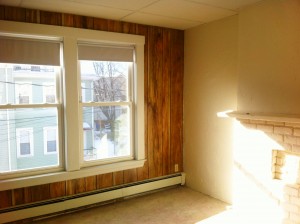
I used an app on my phone that allowed me to hide listings that were useless to me, and that notified me whenever an apartment meeting my search criteria was posted, so to some degree I was able to automate my end of things the way the brokers could. But even this left a lot to be desired: hiding an ad, for instance, only hid that copy of the ad; if a broker copied/pasted the content into a “new” ad rather than clicking to renew the original ad, the ad would reappear in my list. No matter how many suburban areas I subtracted in my search criteria (e.g. “–Waltham –Woburn –Winchester”), there was always some town I hadn’t thought of that slipped through the cracks (get thee back to the North Shore section, Lynn), and subtracting too many made my app crash (again, and again, and again). Even when an ad sounded promising, there were still plenty of ways for things to go wrong: Boston has a record low vacancy rate for rental properties right now, which means even in the “off-season” (most Boston leases expire August 31), landlords can charge higher rents for less desirable spaces (think mold, mouse droppings, smoke damage, no kitchen, or neon orange shag carpeting), and can also be extremely picky about whom they take as tenants (for instance, refusing an application from a quiet, boring grad student with perfect references because she has a cat—ahem).
In the end I finally did find a place (apartment name: TBA), and it was one that I called about after seeing an ad on Craigslist. But finding that apartment took being willing to pay a bit more in rent than I’d wanted, being willing to put some of my furniture in storage, and—this is the big one—taking on apartment searching as a more than full-time job for 11 solid days. (I did take New Year’s Day off, but only because no one was showing apartments.) The agent who received my fee, on the other hand, showed up to let me see the place, corresponded with me via text message that afternoon, and spent about an hour with me filling out paperwork and processing my application.
Why Craigslist Is Not The Revolution
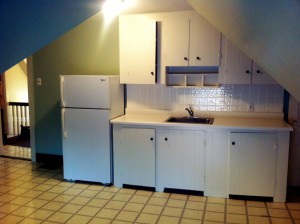
Taken together, my experiences in these three different time periods show the “openness” of Craigslist to be a double-edged sword. Yes, Craigslist could initially be seen as “empowering” for tenants and even landlords because brokers and paid-access ads no longer served as gatekeepers between those two groups. But here’s the thing: those who have power always want to keep their power. The newspaper classifieds have suffered from the rise of Craigslist, and perhaps the brokers did too in the beginning. But today, brokers—who have the extremely competitive rental market to their advantage—have turned Craigslist into not a threat, but a powerful tool for harnessing free labor from prospective tenants. Because Craigslist itself depends upon the free labor of users to flag inappropriate posts for removal (such as spam ads, overposted ads, miscategorized ads, etc; basically all the things that make Boston Craigslist “Apartments for Rent” nearly unusable), the brokers get away with posting these kinds of ads; even I burned out on trying to flag all the overposts after about a week. At least in Boston, at least during this year’s “off-season,” Craigslist is not the world’s biggest threat to professional rental brokers; rather, it’s the suite of reasons most prospective tenants are likely to end up renting through a broker rather than from a landlord directly.
A dedicated apartment-seeker must now put a near-pathological about of time and effort into sifting through ads, making phone calls, meeting brokers, and viewing apartments. On the other hand, a broker (with a desirable listing) can forego the time-consuming process of talking to prospective tenants and driving them to see apartments, and can instead earn a four-figure fee by doing little more than copying preexisting text from a brokerage database, repeatedly pasting it into Craigslist ads, hosting an open house (or letting a few people in to look around), running a credit check, and making sure new tenants initial each page of thick lease agreements. I’m not saying the broker’s end doesn’t involve work, but I am saying the lucky broker (with good listings) has a lot less work than s/he did in 1999. The prospective tenant, on the other hand, has a whole lot more work cut out for her than she did before the brokers ruined Craigslist, or before Craigslist even existed.
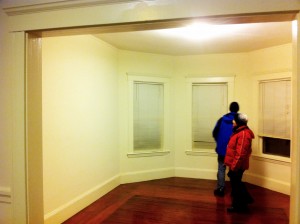
Much as Facebook makes “sharing” much easier and less time-consuming than “being shared with,” present-day Craigslist (and the affordances of digital technologies generally) makes posting ads much, much easier than sorting through and reading ads. Brokers have a double-incentive to spam Craigslist with 40 ads for the same apartment: doing so means a greater chance that prospective tenants will see an ad and call about it, and doing so makes it much, much harder for a tenant to find an apartment without a broker’s help. While in theory one can avoid most of the spammy over-posting by sticking to the “by owner” section, that only works when landlords post apartments there—and during the “off-season” of 2012-2013, it seems few property owners are doing so (nor do they have much incentive to do so, given that the tenant customarily pays the broker’s fee in Boston). For some people, it becomes much easier to pick a broker, look at what she or he takes them to see, and choose from that array, rather than continue to weed through the chaos of Craigslist.
When a tenant signs a lease after being taken to see a number of apartments, this does represent more work[ii] for the broker than I’ve described above; that broker is not benefiting from the tenant’s free labor to the same extent as does a broker who only has to do a showing and print out a lease. Even the broker who spends an hour driving a prospective tenant around, however, still benefits from Craigslist Chaos, because that chaos makes looking for an apartment without a broker much more difficult and unpalatable. Plus, chances are good that the prospective tenant found the broker through Craigslist, probably by responding to a specific ad (for an apartment that may or may not actually be available).
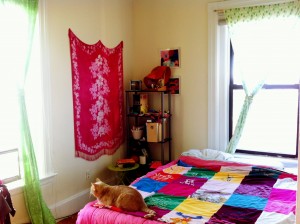
If Boston Craigslist were less open—say, if it charged brokers a fee for posting rental listings, as does New York Craigslist—perhaps it could have remained more “revolutionary,” more of a venue for empowering tenants and landlords to find each other directly. As it stands, however, the openness of Boston Craigslist, combined with the competitive rental market, have turned Boston Craigslist into a tool for reinforcing broker hegemony.
Whitney Erin Boesel is ridiculously excited to be moving back to Cambridge later this month. Her Twitter address, however, will remain unchanged: you can send tweets to @phenatypical.
Author in Park Street Station photo by Blake Brasher
All other photos by Whitney Erin Boesel. Used with permission.
[i] Today, Craigslist charges fees to post some types of ads in some cities.
[ii] One broker in particular put a lot of work into trying to find me a place. When I finally ended up renting through someone else, I felt really guilty about it—because I remember thinking, “wow, this person is really earning that broker’s fee.” I love my new place, and the broker who rented it to me was helpful, but the person I rented from didn’t do nearly as much work as did this particular broker from whom I didn’t end up renting.

Comments 8
Callan — January 8, 2013
Ugh. Your piece is spot on, but this situation... ugh, ugh, a thousand times ugh. I'm not sure when the current broker-fest started, but has certainly done nothing but accelerate between now and early 2011. At first, this overpost/slight listing alteration approach seemed targeted at the student-heavy neighborhoods -- where brokers are notoriously successful at collecting fees -- but as of when I was searching for places in the area this past fall, it had expanded to the somewhat harder to rent areas in Metrowest and the North Shore as well.
Between the low vacancy rates, misleading listings, inaccurate pictures, and stress over living arrangements, forking over the finder's fee seems a small price to pay to get out of such a tedious game. At least I feel I've gotten some first-hand experience with playing that game out here by now, but greater Boston is filled with a constantly rotating stock of newcomers who don't have that experience, as well as people whose circumstances don't grant them the time/ability/intestinal fortitude to put up with this "system." So, the brokers are poised to keep cashing in big -- especially as this could easily have the effect of dissuading owners from posting their own listings, and/or inspiring owners to adopt these same spammy practices. Sigh.
Why Craigslist Is Not The Revolution ? Cyborgology | imituvuvepe — January 9, 2013
[...] Source: http://thesocietypages.org/cyborgology/2013/01/07/why-craigslist-is-not-the-revolution/ [...]
Kirsty Park — January 9, 2013
Reading this made me think of when I was working in recruitment and noticed a similar thing happen with job postings here in Ireland. There's an abundance of websites to look for jobs but they are often overpopulated with posts from recruitment agencies which are often duplicates or out of date. Aggregate sites like Indeed.ie are also hard to navigate because there's so many duplicate posts coming from a variety of job boards.
At one point it seemed that social media could provide a bit of an outlet for that as a hashtag developed that was pretty much an exclusive stream for jobs that were urgent or coming from non-agencies but eventually that caught the agencies attention too and has become a lot less useful.
There have been job boards that disallow agencies but they seem to suffer from being too closed and not offering enough jobs that they're seen as a place to go and search for jobs.
All that to say that at times I think there is a need for something that's less open, not to exclude agencies but to make sure that agencies don't take over and break the functionality that should be added by sites that allow postings for things like jobs or rentals.
I'd be interested to know how things are in America with regards to recruitment though and if the same things happen online.
Anthony — January 11, 2013
I last looked for apartments in Cambridge in 2007--pre housing collapse--and Boston craiglist was already becoming a mess. I spent a good week of full-time searching to find a place, and in the end went with a broker. I saw the same apartments listed multiple times. I saw apartments in the boston/camb/brook section that should have been in different sections. I saw a lot of listings for apartments that weren't available anymore; I remember explicitly thinking this had become a thing and was probably a way of baiting potential tenants into using a broker. I haven't looked for apartments on craigslist recently, but I'm not surprised it's gotten worse.
This blog post is excellent for highlighting why sites like craigslist will not be revolutionary as currently formulated. There's every reason for something like this to happen to any "open" web site, and no corrective mechanism to stop it or slow it down. A corrective will by definition involve coercion, as there's clearly a subpopulation of users who want craigslist (for instance) to be unusable in this way (this could be coercion by carrot). Open/horizontal/democratic/whatever you want to call them groups seem to struggle with reversing the tyranny of the minority once it begins to manifest.
Mediated Emotions » Cyborgology — May 30, 2013
[...] living arrangements to the back burner. As Whitney Erin Boesel (@Phenatypical) detailed in an earlier post, finding a place to live can be something of a challenge. This challenge was sharpened by our [...]
The Spotification Diaries » Cyborgology — September 21, 2013
[...] 2013 became February 2013, and I began the cross-country drive to move back to MA from CA. When I’d done my first cross-country roadtrip (the one that took me to CA from MA over August of [...]